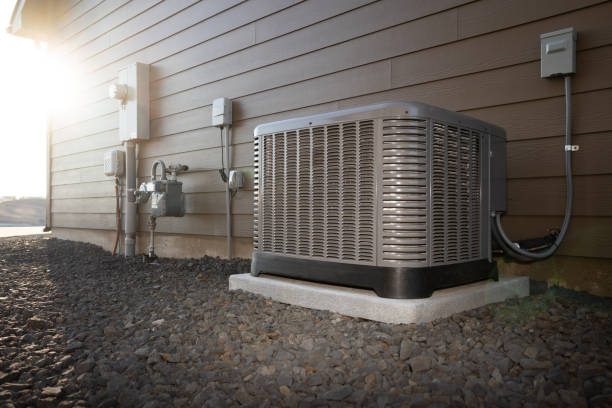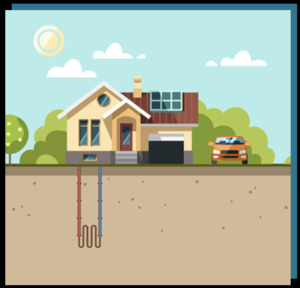Getting a good night’s sleep isn’t just about having a comfortable mattress or keeping a bedtime routine. The air you breathe, the temperature of your bedroom, and even the quiet hum (or roar) of your HVAC system can dramatically impact your rest. For many people, the connection between better sleep with HVAC and overall wellness is overlooked — yet it’s one of the most powerful ways to ensure you wake up feeling refreshed.
In this guide, we’ll explore how your HVAC system influences your sleep, what adjustments you can make for better sleep with HVAC, and why upgrading to energy-efficient solutions like geothermal systems can be a game-changer.
Why Sleep Quality Depends on Your Indoor Environment
Your bedroom environment is a major factor in how well you sleep. Noise, air quality, and temperature all affect your body’s ability to enter deep, restorative sleep stages. While most people focus on blackout curtains or white noise machines, your HVAC system plays a silent yet significant role in shaping those conditions.
Here’s how it helps create better sleep with HVAC:
- Temperature control keeps your body in its optimal sleep range.
- Air quality management ensures you’re not breathing in allergens or pollutants.
- Noise reduction from a quiet HVAC system prevents disruptions.
Together, these elements directly connect your HVAC and sleep quality, proving how essential your system is for better sleep with HVAC.

The Science of Sleep and Temperature
Did you know your body temperature naturally drops as you prepare for sleep? Studies show that the ideal sleep temperature is between 60–67°F (15–19°C). Too hot or too cold, and your sleep quality suffers.
Your HVAC system helps you maintain this ideal climate consistently throughout the night, preventing the restless tossing and turning that happens when the room overheats or becomes chilly. That’s the secret to better sleep with HVAC.
Quick Tip: Use a programmable thermostat to set slightly cooler temps at night — your HVAC system will do the rest for better sleep with HVAC.
Air Quality and Restful Sleep
If you’ve ever woken up with a stuffy nose, dry throat, or itchy eyes, your indoor air quality may be to blame. Pollutants, allergens, and poor humidity balance can interfere with breathing, leading to restless nights.
Your HVAC system supports better sleep with HVAC by:
- Filtering dust, pollen, and allergens.
- Balancing humidity levels to prevent dryness or excess moisture.
- Improving ventilation for fresher bedroom air.
This direct connection between indoor air and better sleep with HVAC is why regular maintenance of filters, ducts, and humidity controls is so vital.
Noise Levels: Why a Quiet HVAC System Matters
A noisy air conditioner or furnace can interrupt sleep cycles, especially for light sleepers. Fortunately, modern systems — especially geothermal heat pumps — are designed for quiet, seamless operation.
A quiet HVAC system means fewer disturbances and more restorative rest — another major factor in achieving better sleep with HVAC.
How HVAC Settings Can Improve Nighttime Comfort
To optimize your system for better sleep with HVAC, consider these upgrades:
- Smart Thermostats: Automatically adjust to your sleep schedule.
- Zoned Heating & Cooling: Keep bedrooms at perfect temperatures without over-conditioning the entire house.
- Air Purifiers & Filters: Enhance air quality and reduce irritants.
- Humidity Control: Maintain ideal moisture for breathing comfort.
Each of these options brings you one step closer to better sleep with HVAC — and they also help your home run more efficiently.

Geothermal HVAC: The Ultimate Solution for Sleep & Comfort
Traditional HVAC systems can sometimes struggle with consistency and noise. That’s where geothermal technology shines. By tapping into the stable temperatures of the earth, geothermal systems deliver steady, quiet, and efficient heating and cooling year-round.
Benefits of Geothermal for Better Sleep with HVAC:
- Ultra-quiet operation with no disruptive cycling.
- Consistent, balanced temperatures through the night.
- Superior humidity and air quality control.
- Cleaner air thanks to fewer combustion-related pollutants.
When you combine geothermal comfort with smart temperature control, you unlock the formula for better sleep with HVAC every night.
👉 Explore more about geothermal HVAC here: Geothermal Heating & Cooling
Practical Tips to Achieve Better Sleep with HVAC
Here are a few simple steps to make sure your HVAC system supports better sleep with HVAC outcomes:
- Clean or replace air filters regularly to prevent allergens.
- Seal leaks in ducts and windows to stabilize temperature.
- Use blackout curtains alongside HVAC control for consistent comfort.
- Schedule seasonal maintenance to ensure optimal performance.
- Upgrade to geothermal or smart HVAC systems for the quietest, most reliable comfort.
Each of these proactive habits keeps your system efficient and your environment perfect for better sleep with HVAC.
Common Problems That Affect Sleep (and HVAC Fixes)
| Problem | HVAC Solution |
|---|---|
| Room too hot/cold | Smart thermostat or zoning |
| Dry throat or itchy skin | Add humidity control |
| Allergies or congestion | Upgrade filters or add air purifier |
| Noisy HVAC system | Install a geothermal or modern quiet system |
Every issue above can be addressed with the right approach — ultimately leading to better sleep with HVAC.
Conclusion: Rest Easy with the Right HVAC System
Sleep is the foundation of health — and your HVAC system is the unsung hero of comfort. From regulating ideal bedroom temperatures to purifying air and minimizing noise, the link between HVAC and restful sleep is undeniable.
When you focus on better sleep with HVAC, you’re not just improving rest — you’re improving your overall well-being, energy, and mood.
If you’re ready to experience better sleep with HVAC and a more comfortable home, consider upgrading your system or exploring geothermal solutions today.
👉 Learn more about creating a healthier, more restful home: Contact Envirotech Geo Today
FAQs About HVAC and Sleep Quality
1. Can my HVAC system really affect how well I sleep?
Yes. Temperature, air quality, and noise are all influenced by your HVAC system, directly impacting your rest and leading to better sleep with HVAC.
2. What’s the best temperature for sleep?
Most experts recommend between 60–67°F for optimal rest — a perfect range for better sleep with HVAC.
3. Is a geothermal system better for sleep?
Absolutely. Geothermal systems are quiet, stable, and efficient — the ultimate setup for better sleep with HVAC.
4. How often should I change my filters for better sleep quality?
Every 1–3 months, depending on your household and HVAC usage, to ensure better sleep with HVAC.
5. Can smart HVAC technology improve sleep?
Yes. Smart thermostats and zoning systems fine-tune bedroom comfort, delivering consistent conditions for better sleep with HVAC.



